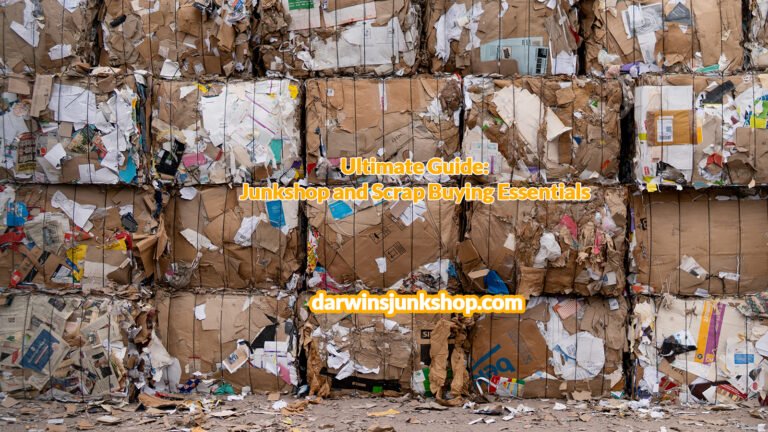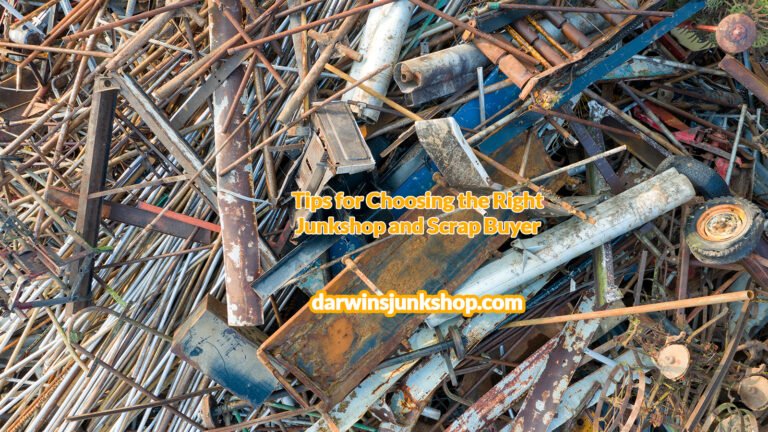Phone:
0939 601 4534
Physical address:
Kapilis, Subabasbas, Lapulapu City 6015

In the world of business, there’s often a focus on manufacturing and selling new goods. However, a market that often slips under the radar is the scrap metal industry. This sector, though not as glamorous as others, holds significant potential for profit and environmental sustainability. Buying scrap not only provides a valuable source of raw materials but also contributes to waste reduction, making it a win-win scenario. This article delves into the ins and outs of the scrap buying business. We’ll guide you through the basics of the recycling business, profitable materials to select, and reliable sources of waste. Additionally, we’ll discuss the environmental impact and sustainability of the business, offering practical tips and strategies to get you started. Whether you’re an entrepreneur seeking a new venture or an environmental enthusiast looking for a way to make a difference, this guide will equip you with the knowledge you need to navigate the scrap buying industry.
It’s crucial to grasp the fundamentals of the recycling business if you’re considering getting into the scrap buying industry. This field involves the collection, sorting, and processing of waste materials into new, usable products. It’s not just about saving the environment; it’s also a lucrative business opportunity. Recyclable materials commonly include paper, plastic, glass, metal, and electronics. The recycling business model is quite versatile; it can range from small-scale local recycling centers to large recycling plants.
The key to success in this industry is understanding the market demand for recyclables and establishing a reliable source of scrap materials. Also, it’s important to have a proper waste management system in place to ensure the efficient handling and processing of scrap materials.
Choosing materials that yield a good profit margin is crucial in your journey as a salvage collector. Not all scrap is created equal; some materials are more valuable than others. It’s important to focus on items that have high resale value and are in demand.
Metals such as copper, aluminum, and steel are typically good choices because they are widely used and command a high price per pound. Electronic waste, or e-waste, can also be profitable due to the precious metals they contain, like gold and silver. While it may take a bit more work to extract these materials, the payoff can be substantial.
Research and stay updated on market rates to ensure you’re getting the best price for your materials. Remember, smart material selection can significantly boost your profits.
Finding dependable sources of waste is a game-changer in the salvage collection industry, boosting your income and ensuring a steady flow of valuable materials. Reliable sources may include construction sites, manufacturing facilities, and recycling centers. These places often have large quantities of scrap materials like metal, wood, and plastics that they dispose of regularly.
Businesses that are remodeling or moving office spaces are another potential source. They may need to dispose of old furniture, electronic equipment, and other valuable items. Establishing a good relationship with these businesses can ensure a consistent supply of scrap.
Finally, consider networking with local waste disposal companies. They can provide insights into where scrap is generated in large volumes. Through strategic partnerships, you can secure a steady scrap supply and maximize your profits.
You’ll be delighted to know that salvaging waste isn’t just good for your wallet, it’s also a boon for our planet. Engaging in scrap buying actively reduces the need for new resources to be extracted, providing a reprieve to the environment. It’s a means of conserving raw materials, reducing emissions and energy usage associated with manufacturing.
Furthermore, recycling scrap helps keep waste out of landfills, reducing soil and water pollution. It promotes a circular economy where resources are reused instead of discarded. This not only preserves our environment but also ensures sustainability for future generations. Therefore, scrap buying has more than just financial benefits – it carries a significant positive impact on the environment and contributes to a sustainable future.
Ready to dive into this eco-friendly venture? Let’s roll up our sleeves and explore some practical tips and strategies to help you successfully navigate this new entrepreneurial path.
Firstly, research is key. Understand the local market and industry trends. Identify the types of scrap that are in high demand and which you can feasibly collect and sell. Next, create a solid business plan, outlining your budget, potential profits, and marketing strategies. Remember to include the cost of necessary equipment and transportation. Additionally, establish relationships with local businesses that generate scrap. Offer them a convenient and environmentally-friendly disposal solution. Lastly, ensure you comply with all relevant environmental regulations and licenses. With these tips, you are well on your way to creating a successful scrap buying business.
Starting a business involving purchase of discarded items requires considerations of legal aspects such as obtaining necessary permits and licenses, compliance with environmental regulations, and understanding local laws on waste disposal and recycling.
Technology can enhance efficiency in any business. It could be used for inventory management, efficient record-keeping, and online marketing. Additionally, applications can help streamline pickups and deliveries, improving overall operational efficiency.
Common challenges include price volatility, improper waste management, and legal restrictions. Mitigation strategies involve market research, adoption of effective waste management systems, and ensuring compliance with environmental and trade regulations.
Establishing a competitive edge in any market requires a thorough understanding of the industry, providing excellent customer service, offering competitive pricing, and staying ahead with technological advancements and industry trends.
Effective marketing strategies for any business include a strong online presence, targeted advertising, collaboration with related businesses, and excellent customer service. Offering competitive prices can also attract and retain customers.
In conclusion, starting a scrap buying business isn’t just profitable, it’s also sustainable. By understanding the basics, choosing profitable materials, finding reliable waste sources, and considering environmental impacts, you’re on the right path. Just remember, it’s not just about making money, it’s also about making a difference. So, get started, use these tips, and make your mark in the recycling business.

In the bustling city of Lapu-Lapu, a small yet significant movement towards environmental sustainability has been steadily growing. At the heart of this movement are the local junkshops, unrecognized heroes of waste management. These establishments not only provide a livelihood…

Are you tired of the daily grind and looking for a new, exciting hobby that has the potential to put some extra cash in your pocket? Look no further! Junkshop and scrap buying is not only a fun and adventurous…

In today’s world, recycling and proper waste disposal are essential for preserving our environment. One effective way to contribute to this cause is by selling your scrap materials to a junkshop or scrap buyer. However, with so many options available,…